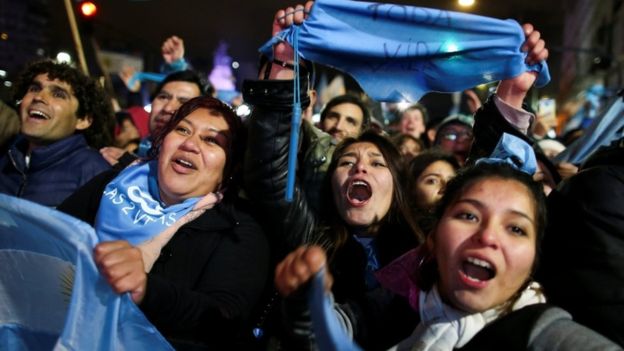Blog Post
VICTORY: Argentina rejects the legalization of abortion
By Jonathon Van Maren
It was a close vote, but late last night the result finally came in: the Argentinian senate has rejected attempts to legalize abortion in that country. From the BBC:
Argentina’s senate has rejected a bill which would have legalised abortion in the first 14 weeks of pregnancy.
After a marathon debate, 38 senators voted against it and 31 in favour. Its defeat means lawmakers must wait until next year to resubmit legislation.
Currently abortion is allowed in Argentina only in cases of rape, or if the mother’s health is in danger.
Some pro-choice campaigners started fires and lobbed missiles at police in Buenos Aires after the vote.
Demonstrators on both sides of the debate had rallied outside parliament as voting took place.
Anti-abortion activists have been jubilant. “It’s a joy to see that our society can be based on such an important principle as the defence of the most defenceless, the child,” said one.
Much has been made by the left-wing press of the hundreds of thousands of abortion supporters who marched to demand legalization, but what has been ignored is the fact that many times that number had taken to the streets in support of life in May, when around 3.8 million Argentinians joined the March for Life. In contrast, the Women’s March earlier this year had about 350,000 participants.
To their credit, the BBC did record the reactions of a few pro-life activists, who rallied during the vote wearing blue bandanas (the abortion activists wore green):
Camila Duro, 24, is a member of the non-religious, non-partisan anti-abortion NGO Frente Joven.
The message that we wanted to put across is that abortion equals social failure. For a woman to resort to it, many other things need to have failed first.
Secondly, we believe that abortion-related maternal mortality can be lowered through other means, such as a range of public health initiatives to take care of the mother – and not through legalising abortion.
And we say that is never a good idea to end a life in order to solve other problems; that’s like sticking a plaster over a bleeding wound. We say “let’s defend both lives” – the mother’s and the unborn child’s.
So we took to the streets, even though it wasn’t easy. Pro-life groups in Argentina are not easy to mobilise, it does not come naturally to us. But we felt the pressure to become more visible.
We organised “blue marches” [the colour chosen by a conglomerate of groups opposing the bill]: we went out with stickers and banners and we went around the neighbourhoods, knocking on people’s doors one by one to foster debate around the bill.
We asked for a referendum similar to the one Ireland had just months ago, but the “green side” refused. Maybe they anticipated that the ballot boxes would reveal that, once you leave the capital, many people in Argentina are against a broad legalisation of abortion.
The abortion activists, with the assistance of enormous amounts of cash from the international abortion industry, are sure to keep trying, perhaps as soon as next year. But what this vote illustrates is that the legalization of abortion is far from inevitable, as the elites like to claim—especially when the pro-life majority pushes back.








